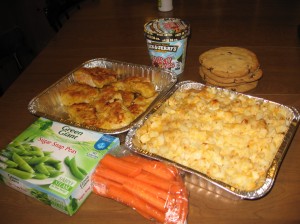I used to think it was a little silly, the way so many of us (particularly women, it seems) respond to major events in other people’s lives, whether happy or sad, by sending food. As if a pound cake will mend a heart broken by an unexpected death. As if a pan of turkey tetrazzini will make the “witching hour” less crazy-making for a mom caring for a newborn, a toddler, and a preschooler.
Then I got cancer. And for two months, people fed me and my family. For two months, people—close friends as well as acquaintances, even a few people I’d never actually met before—showed up at my door with chili and casseroles and salads and cake. And it suddenly made sense, this impulse to feed people who are going through something life-altering. For those eight weeks, what to make for dinner was not on my daily agenda. For eight weeks, I got a daily reminder that my family was not dealing with my cancer by ourselves.
For almost a year, I’ve been waiting for an opportunity to do for someone else what everyone did for me. I got it this week, when a good friend lost her father to complications of multiple sclerosis mere days before giving birth to her third baby, and first son. When I heard about her dad, I told her I’d be bringing a meal, because either she would be grieving and hugely pregnant, or grieving and caring for a newborn. Neither of which would be particularly easy.
So I made this meal.
And I was reminded again of why food played such a big role in Jesus’s life and ministry (the loaves and fishes, the last supper, the disciples eating fish on the beach with the resurrected Christ). The best lesson I learned from my cancer was that feeding people really is the most tangible and humble way we have to love one another.
The second-best lesson was that, for some reason, when people make meals for someone who is sick, grieving, or caring for a new baby, they deem pasta with red sauce to be the perfect thing. Lasagna and baked ziti and meatballs in sauce. I adore pasta with red sauce, and make this recipe at least once a month, eating it every day for lunch and dinner until I’ve swabbed the last bit from the bottom of my pasta bowl with a crust of bread. But after two months of eating what other people provided, I was red-sauced out. One day, near the end of my treatment, my husband found me in the kitchen, head in hands and on the brink of tears. I had gone into the freezer to see what of my cancer bounty was left that I could serve for dinner, and all I found was a big tupperware container of red sauce. I simply could not bear to eat any more red sauce. It sounds petty and ungrateful, and it was, though perhaps the fact that I was going through cancer treatment during the snowiest New England winter in memory could be considered mitigating factors. My husband, bless him, shooed me out of the kitchen, did something with the red sauce (I never asked what), and ordered take-out for dinner. I don’t remember what we ate that night, only that it didn’t involve red sauce.
So for my friend’s meal this week, I avoided red sauce and instead made pan-fried chicken and creamy potato casserole, which is so full of fatty dairy products that it is really only appropriate for a nursing mother. All those extra calories will go straight to work fattening up the baby.
Besides providing more fat and calories than are really necessary, what will this meal really do for my friend? Not much. She’ll still miss her dad. She’ll still have hundreds of days in which she’ll be scrambling to put food on the table at the time of day when she and her kids are most tired and needy. My little meal won’t change any of that. Just as all the meals I got last winter didn’t change the fact that every day for weeks, I trudged to the hospital, where I lay with chest fully exposed as a room full of radiology techs (male and female…all young and good-looking, of course) prepared to zap my misshapen, surgery-scarred breast with killing radiation. Just as the meals my friend Rachel brought to her longtime friend Mr. S. in his final days in a nursing home didn’t take away his severe pain or keep him from dying last week as he held his wife’s hand.
No, these meals we offer to one another during life’s most demanding moments don’t really change anything, don’t really do anything. Except give people a visible, substantial, simple reminder that they are not alone. Which is a pretty big thing after all.












